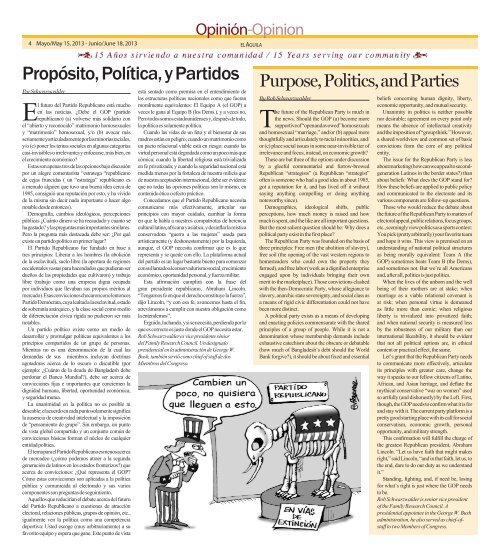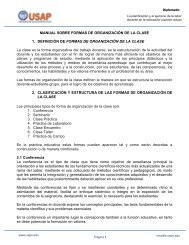AGUILA
You also want an ePaper? Increase the reach of your titles
YUMPU automatically turns print PDFs into web optimized ePapers that Google loves.
4 Mayo/May 15, 2013 - Junio/June 18, 2013<br />
Propósito, Política, y Partidos<br />
Por Schwarzwalder<br />
El futuro del Partido Republicano está mucho<br />
en las noticias. ¿Debe el GOP (partido<br />
republicano) (a) volverse más solidario con<br />
el “abierto y reconocido” matrimonio homosexuales<br />
y “matrimonio” homosexual, y/o (b) avocar más<br />
seriamente y articuladamente por las minorías raciales,<br />
y/o (c) poner los temas sociales en algunas categorías<br />
casi-invisibles o irrelevantes y enfocarse, más bien, en<br />
el crecimiento económico?<br />
Estas son apenas tres de las opciones bajo discusión<br />
por un alegre comentarista “estratega “republicano<br />
de cejas fruncidas ( un “estratega” republicano es<br />
a menudo alguien que tuvo una buena idea cerca de<br />
1985, consiguió una reputación por esto, y ha vivido<br />
de la misma sin decir nada importante o hacer algo<br />
notable desde entonces).<br />
Demografía, cambios ideológicos, percepciones<br />
públicas ¿Cuánto dinero se ha recaudado y cuanto se<br />
ha gastado? y las preguntas más importantes similares.<br />
Pero la pregunta más destacada debe ser: ¿Por qué<br />
existe un partido político en primer lugar?<br />
El Partido Republicano fue fundado en base a<br />
tres principios: Liberar a los hombres (la abolición<br />
de la esclavitud), suelo libre (la apertura de regiones<br />
occidentales vastas para hacendados que pudieran ser<br />
dueños de las propiedades que cultivaron) y trabajo<br />
libre (trabajo como una empresa digna ocupada<br />
por individuos que llevaban sus propios méritos al<br />
mercado). Esas convicciones chocaron con el entonces<br />
Partido Demócrata, cuya lealtad a la esclavitud, estado<br />
de soberanía anárquico, y la clase social como medio<br />
de diferenciación cívica rígida no pudieron ser más<br />
notables.<br />
Un partido político existe como un medio de<br />
desarrollar y promulgar políticas equivalentes a los<br />
principios compartidos de un grupo de personas.<br />
Mientras no es una denominación de la cual las<br />
demandas de sus miembros incluyan doctrinas<br />
agotadoras acerca de lo oscuro o discutible (por<br />
ejemplo: ¿Cuánto de la deuda de Bangladesh debe<br />
perdonar el Banco Mundial?), debe ser acerca de<br />
convicciones fijas e importantes que conciernen la<br />
dignidad humana, libertad, oportunidad económica,<br />
y seguridad mutua.<br />
La unanimidad en la política no es posible ni<br />
deseable; el acuerdo en cada punto solamente significa<br />
la ausencia de creatividad intelectual y la imposición<br />
de “pensamiento de grupo”. Sin embargo, un punto<br />
de vista global compartido y un conjunto común de<br />
convicciones básicas forman el núcleo de cualquier<br />
entidad política.<br />
El tema para el Partido Republicano es menos acerca<br />
de mercadeo (¿cómo podemos atraer a la segunda<br />
generación de latinos en los estados fronterizos?) que<br />
acerca de convicciones: ¿Qué representa el GOP?<br />
Cómo estas convicciones son aplicadas a la política<br />
pública y comunicada al electorado y sus varios<br />
componentes son preguntas de seguimiento,<br />
Aquellos que reducirían el debate acerca del futuro<br />
del Partido Republicano a cuestiones de atracción<br />
electoral, relaciones públicas, grupos de opinión, etc.,<br />
igualmente ven la política como una competencia<br />
deportiva: Usted escoge (muy arbitrariamente) a su<br />
favorito equipo y espera que gane. Este punto de vista<br />
está sentado como premisa en el entendimiento de<br />
las estructuras políticas nacionales como que fueran<br />
moralmente equivalentes: El Equipo A (el GOP) a<br />
veces le gana al Equipo B (los Dems.), y a veces no,<br />
Pero todos somos estadounidenses y, después de todo,<br />
la política es solamente política.<br />
Cuando las vidas de un feto y el bienestar de sus<br />
madres están en peligro; cuando un matrimonio como<br />
un pacto relacional viable está en riesgo; cuando las<br />
virtud personal está degradada como un poco más que<br />
cómica; cuando la libertad religiosa está trivializada<br />
en fe privatizada; y cuando la seguridad nacional está<br />
medida menos por la fortaleza de nuestra milicia que<br />
de nuestra aceptación internacional, debe ser evidente<br />
que no todas las opciones políticas son lo mismo, en<br />
contenido ético o efecto práctico.<br />
Concedamos que el Partido Republicano necesita<br />
comunicarse más efectivamente, articular sus<br />
principios con mayor cuidado, cambiar la forma<br />
en que le habla a nuestros compatriotas de herencia<br />
cultural latina, africana y asiática, y desinflar la mística<br />
conservadora “guerra a las mujeres” usada para<br />
artísticamente (y deshonestamente) por la Izquierda,<br />
aunque, el GOP necesita confirmar que es lo que<br />
representa y se quede con ello. La plataforma actual<br />
del partido es un lugar bastante bueno para comenzar<br />
con su llamado al conservadurismo social, crecimiento<br />
económico, oportunidad personal, y fuerza militar.<br />
Esta afirmación cumplirá con la frase del<br />
gran presidente republicano, Abraham Lincoln.<br />
“Tengamos fe en que el derecho constituye la fuerza”,<br />
dijo Lincoln, “y con esa fe, avancemos hasta el fin,<br />
atrevámonos a cumplir con nuestra obligación como<br />
la entendemos”.<br />
Erguido, luchando, y si se necesita, perdiendo por lo<br />
que es correcto es justo donde el GOP necesita estar.<br />
Rob Schwarzwalder es vice presidente sénior<br />
del Family Research Council. Un designado<br />
presidencial en la administración de George W.<br />
Bush, también sirvió como chief of staff de dos<br />
Miembros del Congreso.<br />
Opinión-Opinion<br />
el AguilA<br />
Purpose, Politics, and Parties<br />
By Rob Schwarzwalder<br />
The future of the Republican Party is much in<br />
the news. Should the GOP (a) become more<br />
supportive of “open and avowed” homosexuals<br />
and homosexual “marriage,” and/or (b) appeal more<br />
thoughtfully and articulately to racial minorities, and/<br />
or (c) place social issues in some near-invisible tier of<br />
irrelevance and focus, instead, on economic growth?<br />
These are but three of the options under discussion<br />
by a gleeful commentarial and furrow-browed<br />
Republican “strategists” (a Republican “strategist”<br />
often is someone who had a good idea in about 1985,<br />
got a reputation for it, and has lived off it without<br />
saying anything compelling or doing anything<br />
noteworthy since).<br />
Demographics, ideological shifts, public<br />
perceptions, how much money is raised and how<br />
much is spent, and the like are all important questions.<br />
But the most salient question should be: Why does a<br />
political party exist in the first place?<br />
The Republican Party was founded on the basis of<br />
three principles: Free men (the abolition of slavery),<br />
free soil (the opening of the vast western regions to<br />
homesteaders who could own the property they<br />
farmed), and free labor (work as a dignified enterprise<br />
engaged upon by individuals bringing their own<br />
merit to the marketplace). Those convictions clashed<br />
with the then-Democratic Party, whose allegiance to<br />
slavery, anarchic state sovereignty, and social class as<br />
a means of rigid civic differentiation could not have<br />
been more distinct.<br />
A political party exists as a means of developing<br />
and enacting policies commensurate with the shared<br />
principles of a group of people. While it is not a<br />
denomination whose membership demands include<br />
exhaustive catechism about the obscure or debatable<br />
(how much of Bangladesh’s debt should the World<br />
Bank forgive?), it should be about fixed and essential<br />
beliefs concerning human dignity, liberty,<br />
economic opportunity, and mutual security.<br />
Unanimity in politics is neither possible<br />
nor desirable; agreement on every point only<br />
means the absence of intellectual creativity<br />
and the imposition of “group think.” However,<br />
a shared worldview and common set of basic<br />
convictions form the core of any political<br />
entity.<br />
The issue for the Republican Party is less<br />
about marketing (how can we appeal to secondgeneration<br />
Latinos in the border states?) than<br />
about beliefs: What does the GOP stand for?<br />
How these beliefs are applied to public policy<br />
and communicated to the electorate and its<br />
various components are follow-up questions.<br />
Those who would reduce the debate about<br />
the future of the Republican Party to matters of<br />
electoral appeal, public relations, focus groups,<br />
etc., seemingly view politics as a sports contest:<br />
You pick (pretty arbitrarily) your favorite team<br />
and hope it wins. This view is premised on an<br />
understanding of national political structures<br />
as being morally equivalent: Team A (the<br />
GOP) sometimes beats Team B (the Dems),<br />
and sometimes not. But we’re all Americans<br />
and, after all, politics is just politics.<br />
When the lives of the unborn and the well<br />
being of their mothers are at stake; when<br />
marriage as a viable relational covenant is<br />
at risk; when personal virtue is demeaned<br />
as little more than comic; when religious<br />
liberty is trivialized into privatized faith;<br />
and when national security is measured less<br />
by the robustness of our military than our<br />
international likeability, it should be evident<br />
that not all political options are, in ethical<br />
content or practical effect, the same.<br />
Let’s grant that the Republican Party needs<br />
to communicate more effectively, articulate<br />
its principles with greater care, change the<br />
way it speaks to our fellow citizens of Latino,<br />
African, and Asian heritage, and deflate the<br />
mythical conservative “war on women” used<br />
so artfully (and dishonestly) by the Left. First,<br />
though, the GOP needs to confirm what it is for<br />
and stay with it. The current party platform is a<br />
pretty good starting place with its call for social<br />
conservatism, economic growth, personal<br />
opportunity, and military strength.<br />
This confirmation will fulfill the charge of<br />
the greatest Republican president, Abraham<br />
Lincoln. “Let us have faith that might makes<br />
right,” said Lincoln, “and in that faith, let us, to<br />
the end, dare to do our duty as we understand<br />
it.”<br />
Standing, fighting, and, if need be, losing<br />
for what’s right is just where the GOP needs<br />
to be.<br />
Rob Schwarzwalder is senior vice president<br />
of the Family Research Council. A<br />
presidential appointee in the George W. Bush<br />
administration, he also served as chief-ofstaff<br />
to two Members of Congress.

















